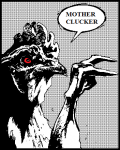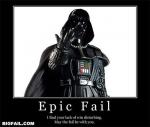 Powder, on 04 May 2015 - 05:59 PM, said:
Powder, on 04 May 2015 - 05:59 PM, said:
@Frook
I feel as though you are being disingenuous with your request. What is your burden of proof?
Lets say I have a medical record of a cancer patient getting inexplicably better after prayer. Its inexplicable, but you will could say that inexplicable things happen with regularity.
I could have medical records of someones limb regrowing, but that record could be wrong, and the individual testifying that their limb regrew could be lying.
I could have the death certificate for an individual who has come back to life, and you will insist that the coroner was in fact wrong.
You could have a vision of God, see something supernatural and hear a voice from heaven and you can excuse it as a hallucination.
We could video record any of the above, and you will cry out special effects, or shopped if its a still frame.
I could tell you that I have been healed myself, personally, and you would tell me that its either just placebo effect, wishful thinking, or I am lying/deceived.
When your presupposition is that certain things cannot happen under any circumstances, you end up categorically rejecting anything offered as proof, so asking for proof is an exercise in futility.
I think the difference (that Frook seems to be suggesting) is between something that is impossible to prove (at present), and something that seems provably impossible; something that isn't just miraculous, but is demonstrably miraculous.
Your point about science is fair, to a point. If we find something that we can't explain, the scientific approach is not to say that it is unexplainable, but just that we can't explain it yet -- that it happens for explainable (non-miraculous) reasons that we might discover. We can consider three states. Firstly, something has been unexplainable and we have found an explanation. Secondly, something has been unexplainable and remains unexplainable at present. In the third plcae, I would place miracles; something that has been unexplainable and
will remain unexplainable since it has no explanation other than being miraculous.
For a convincing demonstration of a miracle, we must look in the second position. The first position isn't going to convince people, because it can be explained. But neither is the second really, as you say, because there is no proof that it cannot be explained and that it actually falls into the third position rather than the first.
This puts miracles in a difficult position; after all, we don't know everything knowable yet -- we don't know what might remain unexplainable. We might also discover that some things are unexplainable simply because we lack the resources to experiment on them them properly.
The question is then whether or not there are possible miracles that don't have this problem; things that seem convincingly impossible rather than just currently unknown. To me, it seems that we need here to look to the most well-established, most tested, areas of knowledge. Something contradictory or unexplainable on the cutting edge of science simply seems par for the course, while something unexplainable in an area more well established would be more convincing.
You're right to point out that exceptions may be handwaved as aberrations of results of experimental flaws. Imre Lakatos highlights this issue with Karl Popper's theory of the science through falsificationism (a theory which would be one of the common responses to your point about science being unable to meet an absolute standard of proof, since it is a response to the issue that Hume raises about scientific induction). Popper argues that falsificationism solves issues with scientific provability. The standard he posits is one of testability; the strongest theories are those that are easily disproven, but have survived repeated testing. He argues that instead of seeing science as a measure of absolute truth, it should instead be seen as a measure of current believability (with possible exceptions for a small number of things that can be proven a priori). Lakatos points out that, in actuality, we often don't totally discard a theory when it meets a piece of contradictory evidence -- instead, we try to see if that contradictory evidence is repeatable, if it only happens under certain conditions, if the theory can be reworked to accept it (for Newtonian mechanics is acceptable except that it doesn't work at relativistic speeds). So then, this gives us some idea of what might be a convincing miracle. I think it would need to be something that is repeatable, that contradicts well-established theories, but rather than leading to the conclusion "well, those theories must be totally incorrect" it leads to "well, we seem to have a unique instance of an exception that can't at all be explained by our current understanding (which nonetheless seems correct in every other case)".
A constructed example might be a metal ball in a laboratory. In the past it behaved like a normal ball when dropped, we know what it is made of etc, and it does what a scientist would predicted it to do. Then, after a certain point in time, when dropped, the ball instead bounces at erratic heights -- sometimes higher than it was dropped, sometimes lower, then higher again etc, and does so indefinitely, sometimes it might float, or gradually rise upwards, without pattern to its behaviour. Identical balls dropped in the same place will behave as normal. This will be repeatable, the ball will not revert to normal etc.
This, to me, seems more the sort of convincing miracle Frook wants.
It also somewhat made me curious about what you think about the people in the bible who did get to witness miracles. I've often heard people say that God doesn't reveal himself for that sort of reason (allowing people free choice with their beliefs, or requiring faith which doesn't work so much if he proves himself to exist), but I'm curious how this would be reconciled with a belief that at certain points certain people did seem to have more evidence than we do now (the disciples probably being the most obvious example I suppose).

 Help
Help

















